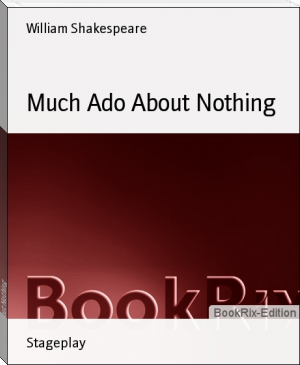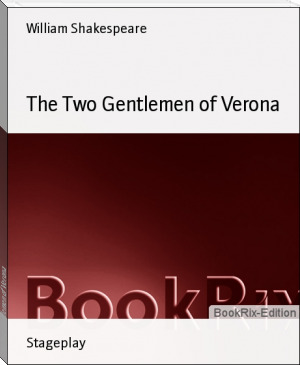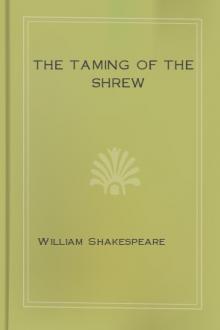Much Ado About Nothing by William Shakespeare (ebook reader with highlighter txt) 📖

- Author: William Shakespeare
Book online «Much Ado About Nothing by William Shakespeare (ebook reader with highlighter txt) 📖». Author William Shakespeare
BOTH. Yea, sir, we hope.
DOGBERRY. Write down that they hope they serve God: and write God first; for God defend but God should go before such villains! Masters, it is proved already that you are little better than false knaves, and it will go near to be thought so shortly. How answer you for yourselves?
CONRADE. Marry, sir, we say we are none.
DOGBERRY. A marvellous witty fellow, I assure you; but I will go about with him. Come you hither, sirrah; a word in your ear: sir, I say to you, it is thought you are false knaves.
BORACHIO. Sir, I say to you we are none.
DOGBERRY. Well, stand aside. Fore God, they are both in a tale. Have you writ down, that they are none?
SEXTON. Master constable, you go not the way to examine: you must call forth the watch that are their accusers.
DOGBERRY. Yea, marry, that's the eftest way. Let the watch come forth. Masters, I charge you, in the prince's name, accuse these men.
FIRST WATCH. This man said, sir, that Don John, the prince's brother, was a villain.
DOGBERRY. Write down Prince John a villain. Why, this is flat perjury, to call a prince's brother villain.
BORACHIO. Master Constable, -
DOGBERRY. Pray thee, fellow, peace: I do not like thy look, I promise thee.
SEXTON. What heard you him say else?
SECOND WATCH. Marry, that he had received a thousand ducats of Don John for accusing the Lady Hero wrongfully.
DOGBERRY. Flat burglary as ever was committed.
VERGES. Yea, by the mass, that it is.
SEXTON. What else, fellow?
FIRST WATCH. And that Count Claudio did mean, upon his words, to disgrace Hero before the whole assembly, and not marry her.
DOGBERRY. O villain! thou wilt be condemned into everlasting redemption for this.
SEXTON. What else?
SECOND WATCH. This is all.
SEXTON. And this is more, masters, than you can deny. Prince John is this morning secretly stolen away: Hero was in this manner accused, in this manner refused, and, upon the grief of this, suddenly died. Master Constable, let these men be bound, and brought to Leonato's: I will go before and show him their examination.
[Exit.]
DOGBERRY. Come, let them be opinioned.
VERGES. Let them be in the hands -
CONRADE. Off, coxcomb!
DOGBERRY. God's my life! where's the sexton? let him write down the prince's officer coxcomb. Come, bind them. Thou naughty varlet!
CONRADE. Away! you are an ass; you are an ass.
DOGBERRY. Dost thou not suspect my place? Dost thou not suspect my years? O that he were here to write me down an ass! but, masters, remember that I am an ass; though it be not written down, yet forget not that I am an ass. No, thou villain, thou art full of piety, as shall be proved upon thee by good witness. I am a wise fellow; and, which is more, an officer; and, which is more, a householder; and, which is more, as pretty a piece of flesh as any in Messina; and one that knows the law, go to; and a rich fellow enough, go to; and a fellow that hath had losses; and one that hath two gowns, and everything handsome about him. Bring him away. O that I had been writ down an ass!
[Exeunt.]
ACT 5.
Scene 1. Before LEONATO'S House.
[Enter LEONATO and ANTONIO.]
ANTONIO. If you go on thus, you will kill yourself And 'tis not wisdom thus to second grief Against yourself.
LEONATO. I pray thee, cease thy counsel, Which falls into mine ears as profitless As water in a sieve: give not me counsel; Nor let no comforter delight mine ear But such a one whose wrongs do suit with mine: Bring me a father that so lov'd his child, Whose joy of her is overwhelm'd like mine, And bid him speak to me of patience; Measure his woe the length and breadth of mine, And let it answer every strain for strain, As thus for thus and such a grief for such, In every lineament, branch, shape, and form: If such a one will smile, and stroke his beard; Bid sorrow wag, cry 'hem' when he should groan, Patch grief with proverbs; make misfortune drunk With candle-wasters; bring him yet to me, And I of him will gather patience. But there is no such man; for, brother, men Can counsel and speak comfort to that grief Which they themselves not feel; but, tasting it, Their counsel turns to passion, which before Would give preceptial medicine to rage, Fetter strong madness in a silken thread, Charm ache with air and agony with words. No, no; 'tis all men's office to speak patience To those that wring under the load of sorrow, But no man's virtue nor sufficiency To be so moral when he shall endure The like himself. Therefore give me no counsel: My griefs cry louder than advertisement.
ANTONIO. Therein do men from children nothing differ.
LEONATO. I pray thee peace! I will be flesh and blood; For there was never yet philosopher That could endure the toothache patiently, However they have writ the style of gods And made a push at chance and sufferance.
ANTONIO. Yet bend not all the harm upon yourself; Make those that do offend you suffer too.
LEONATO. There thou speak'st reason: nay, I will do so. My soul doth tell me Hero is belied; And that shall Claudio know; so shall the prince, And all of them that thus dishonour her.
ANTONIO. Here comes the prince and Claudio hastily.
[Enter DON PEDRO and CLAUDIO.]
DON PEDRO. Good den, good den.
CLAUDIO. Good day to both of you.
LEONATO. Hear you, my lords, -
DON PEDRO. We have some haste, Leonato.
LEONATO. Some haste, my lord! well, fare you well, my lord: Are you so hasty now? - well, all is one.
DON PEDRO. Nay, do not quarrel with us, good old man.
ANTONIO. If he could right himself with quarrelling, Some of us would lie low.
CLAUDIO. Who wrongs him?
LEONATO. Marry, thou dost wrong me; thou dissembler, thou. Nay, never lay thy hand upon thy sword; I fear thee not.
CLAUDIO. Marry, beshrew my hand, If it should give your age such cause of fear. In faith, my hand meant nothing to my sword.
LEONATO. Tush, tush, man! never fleer and jest at me: I speak not like a dotard nor a fool, As, under privilege of age, to brag What I have done being young, or what would do, Were I not old. Know, Claudio, to thy head, Thou hast so wrong'd mine innocent child and me That I am forc'd to lay my reverence by, And, with grey hairs and bruise of many days, Do challenge thee to trial of a man. I say thou hast belied mine innocent child: Thy slander hath gone through and through her heart, And she lied buried with her ancestors; O! in a tomb where never scandal slept, Save this of hers, fram'd by thy villany!
CLAUDIO. My villany?
LEONATO. Thine, Claudio; thine, I say.
DON PEDRO. You say not right, old man,
LEONATO. My lord, my lord, I'll prove it on his body, if he dare, Despite his nice fence and his active practice, His May of youth and bloom of lustihood.
CLAUDIO. Away! I will not have to do with you.
LEONATO. Canst thou so daff me? Thou hast kill'd my child; If thou kill'st me, boy, thou shalt kill a man.
ANTONIO. He shall kill two of us, and men indeed: But that's no matter; let him kill one first: Win me and wear me; let him answer me. Come, follow me, boy; come, sir boy, come, follow me. Sir boy, I'll whip you from your foining fence; Nay, as I am a gentleman, I will.
LEONATO. Brother, -
ANTONIO. Content yourself. God knows I lov'd my niece; And she is dead, slander'd to death by villains, That dare as well answer a man indeed As I dare take a serpent by the tongue. Boys, apes, braggarts, Jacks, milksops!
LEONATO. Brother Antony, -
ANTONIO. Hold your content. What, man! I know them, yea, And what they weigh, even to the utmost scruple, Scambling, out-facing, fashion-monging boys, That lie and cog and flout, deprave and slander, Go antickly, show outward hideousness, And speak off half a dozen dangerous words, How they might hurt their enemies, if they durst; And this is all!
LEONATO. But, brother Antony, -
ANTONIO. Come, 'tis no matter: Do not you meddle, let me deal in this.
DON PEDRO. Gentlemen both, we will not wake your patience. My heart is sorry for your daughter's death; But, on my honour, she was charg'd with nothing But what was true and very full of proof.
LEONATO. My lord, my lord -
DON PEDRO. I will not hear you.
LEONATO. No? Come, brother, away. I will be heard. -
ANTONIO. And shall, or some of us will smart for it.
[Exeunt LEONATO and ANTONIO.]
[Enter BENEDICK.]
DON PEDRO. See, see; here comes the man we went to seek.
CLAUDIO. Now, signior, what news?
BENEDICK. Good day, my lord.
DON PEDRO. Welcome, signior: you are almost come to part almost a fray.
CLAUDIO. We had like to have had our two noses snapped off with two old men without teeth.
DON PEDRO. Leonato and his brother. What think'st thou? Had we fought, I doubt we should have been too young for them.
BENEDICK. In a false quarrel there is no true valour. I came to seek you both.
CLAUDIO. We have been up and down to seek thee; for we are high-proof melancholy, and would fain have it beaten away. Wilt thou use thy wit?
BENEDICK. It is in my scabbard; shall I draw it?
DON PEDRO. Dost thou wear thy wit by thy side?
CLAUDIO. Never any did so, though very many have been beside their wit. I will bid thee draw, as we do the minstrels; draw, to pleasure us.
DON PEDRO. As I am an honest man, he looks pale. Art thou sick, or angry?
CLAUDIO. What, courage, man! What though care killed a cat, thou hast mettle enough in thee to kill care.
BENEDICK. Sir, I shall meet your wit in the career, an you charge it against me. I pray you choose another subject.
CLAUDIO. Nay then, give him another staff: this last was broke cross.
DON PEDRO. By this light, he changes more and more: I think he be angry indeed.
CLAUDIO. If he be, he knows how to turn his girdle.
BENEDICK. Shall I speak a word in your ear?
CLAUDIO. God bless me from a challenge!
BENEDICK. [Aside to CLAUDIO.] You are a villain, I jest not: I will make it good how you dare, with what you dare, and when you dare. Do me right, or I will protest your cowardice. You have killed a sweet lady, and her death shall fall heavy on you. Let me hear from you.
CLAUDIO. Well I will meet you, so I may have good cheer.
DON PEDRO. What, a feast, a feast?
CLAUDIO. I' faith, I thank him; he hath bid me to a calf's-head and a capon, the which if I do not carve most curiously, say my knife's naught. Shall I not find
 In literature a drama genre deserves your attention. Dramas are usually called plays. Every person is made up of two parts: good and evil. Due to life circumstances, the human reveals one or another side of his nature. In drama we can see the full range of emotions : it can be love, jealousy, hatred, fear, etc. The best drama books are full of dialogue. This type of drama is one of the oldest forms of storytelling and has existed almost since the beginning of humanity. Drama genre - these are events that involve a lot of people. People most often suffer in this genre, because they are selfish. People always think to themselves first, they want have a benefit.
In literature a drama genre deserves your attention. Dramas are usually called plays. Every person is made up of two parts: good and evil. Due to life circumstances, the human reveals one or another side of his nature. In drama we can see the full range of emotions : it can be love, jealousy, hatred, fear, etc. The best drama books are full of dialogue. This type of drama is one of the oldest forms of storytelling and has existed almost since the beginning of humanity. Drama genre - these are events that involve a lot of people. People most often suffer in this genre, because they are selfish. People always think to themselves first, they want have a benefit.




Comments (0)